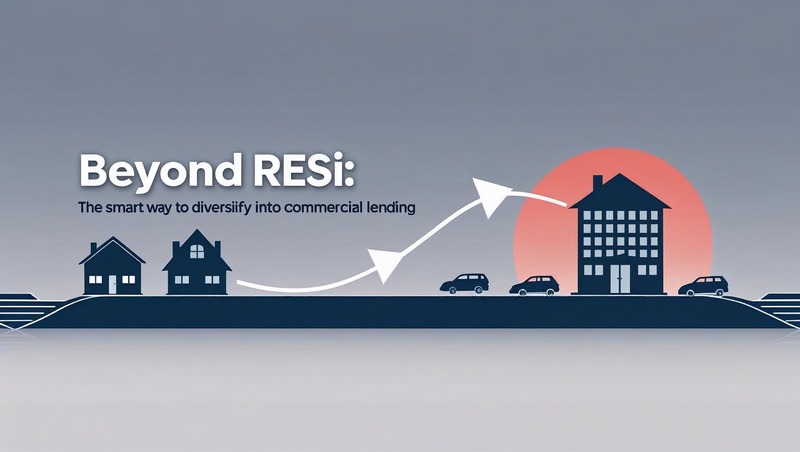Too Busy to Read? We’ve Got You.
Get this blog post’s insights delivered in a quick audio format — all in under 10 minutes.
This audio version covers: Beyond Resi: The Smart Way to Start Diversifying into Commercial Lending
The residential market is the heartland of Australian mortgage broking, but in a dynamic economy, the most resilient businesses are never one-dimensional. You've built a successful practice on the back of your residential expertise, but what's next? How do you future-proof your income streams and deepen your client relationships? The answer, for a growing number of savvy brokers, is commercial finance.
Recent data from the Mortgage and Finance Association of Australia (MFAA) shows a clear trend: nearly a third of mortgage brokers are now also writing commercial loans, a figure that continues to climb.1 This isn't just a fad; it's a strategic evolution. Diversifying into commercial lending is about building a more robust, lower-risk business that can weather the inevitable cycles of the residential property market.1 It creates more consistent income, especially during flat periods in resi lending, and transforms your value proposition from a home loan specialist into a holistic finance partner.3
But let's be honest: the commercial world can seem intimidating. The deal structures are more complex, the risks feel higher, and the language is different. Many brokers see it as a daunting field to navigate, which stops them from tapping into its vast potential.4
That's why we've created this guide. This isn't about diving into the deep end. It's a strategic, low-risk, four-step blueprint designed for busy residential brokers like you. It will show you how to enter the commercial space cautiously and intelligently, building the confidence and competence you need to succeed.
Your 4-Step Blueprint
Step 1: Educate – Master the New Playing Field
The single biggest mistake a residential broker can make is assuming their existing knowledge will directly translate to the commercial world. It won't. Commercial finance isn't just a different product; it's a different discipline, operating on fundamentally different principles, risks, and client motivations.4 Before you can advise a client, you must first become a student.
It's a Different Ballgame: Key Differences You MUST Understand
The most critical shift you need to make is in how you assess a deal. In residential lending, your focus is almost entirely on the borrower. You analyse their personal income, their credit history, and their capacity to service the debt from their salary.6
In commercial lending, the focus pivots dramatically to the asset and the business. The primary question is not "Can the borrower personally afford this?" but "Can this property or business generate enough income to service the debt?".6 Lenders will scrutinise the property's cash flow, the strength and length of its leases, the financial health of the business involved, and the borrower's overall net worth and experience.6 This transition is more than just a product knowledge upgrade; it represents a fundamental identity shift from a B2C transaction facilitator, helping a family buy a home, to a B2B strategic advisor, helping a business achieve its commercial objectives.
To navigate this new terrain, you must internalise the core differences.
Table 1: Residential vs. Commercial Lending: A Broker's Cheat Sheet
| Feature | Residential Lending | Commercial Lending |
|---|---|---|
| Primary Regulation | Governed by the National Consumer Credit Protection (NCCP) Act, offering high consumer protection.10 | Largely unregulated by the NCCP Act, meaning terms are more negotiable but broker and client risk is higher.10 |
| Loan Purpose | Primarily for personal housing, whether owner-occupied or for residential investment.6 | Strictly for business or investment purposes, focused on income generation from commercial assets.6 |
| Underwriting Focus | Borrower's personal income (PAYG/self-employed), credit history, and Debt-to-Income (DTI) ratio.6 | The property's cash flow, lease strength, business viability, and the borrower's financial strength and net worth.6 |
| Typical LVR | Can be as high as 95% with LMI, and sometimes higher for eligible professionals.12 | Generally capped at 65-75%, with 80% possible for smaller loans under specific bank policies.5 |
| Loan Term | Typically 25 to 30 years, designed for long-term principal and interest repayment.6 | Shorter terms of 5 to 20 years are common, often with balloon payments or required refinancing at term end.6 |
| Interest Rates | Generally lower, with a wide availability of long-term fixed-rate options.6 | Typically higher to reflect increased risk, often variable or tied to bank bill swap rates (BBSY).5 |
| Due Diligence | Relatively straightforward: contract review, building and pest inspection, or strata report.8 | Far more extensive, requiring review of leases, zoning laws, environmental reports, and Development Application (DA) approvals.8 |
| Valuation Method | Based on recent comparable sales in the area.8 | Based on the property's income potential, lease stability, and a capitalisation rate formula.7 |
Adopting a Solutions-Focused Mindset
In the residential space, you are often a rate-finder. In the commercial world, you must become a problem-solver.14 Business clients rarely come to you with a simple request for the lowest rate. Their needs are specific, complex, and almost always time-sensitive. They might need a rapid cash injection to pay wages, urgent funding to complete a development project, or capital to seize a sudden growth opportunity.14
Your conversations must shift from "What's the best rate I can get you?" to "What business problem are we trying to solve here?".14 This requires a deeper understanding of different industries and their unique financial pressures. The needs of a retailer seeking to fit out a new shop are vastly different from those of a property developer needing construction finance.14
This is where your value as a broker truly shines. A major bank can take two to three months to assess and approve a commercial loan, a timeline that can kill a business opportunity.14 A broker who understands the landscape and has relationships with a diverse panel of lenders, including non-banks and private lenders, can provide the speed and flexibility that businesses desperately need.14
Your Education Toolkit: Actionable First Steps
Building this foundational knowledge doesn't have to be overwhelming. Here is a practical checklist to get you started:
- Master Your Aggregator's Resources: This is your first and most important port of call. Most major aggregators provide comprehensive training programs, online learning modules, accreditation pathways, and compliance support specifically for commercial lending. They are invested in your success.3
- Connect with Commercial BDMs: Start building relationships with the commercial and business banking BDMs from your lender panel. They are a priceless source of information on lender appetite, policy niches, risk tolerance, and how to structure a deal for success. They can tell you what they want to see in an application before you even submit it.17
- Read What Your Clients Read: Business owners and commercial property investors stay informed by reading business and trade publications. To understand their world, you need to immerse yourself in it. Follow the Australian Financial Review, business magazines, and industry-specific news sites.12
- Consider Formal Qualifications: As you progress, look into formal education. The Diploma of Finance and Mortgage Broking Management is a key qualification held by many experienced commercial brokers and is a requirement for becoming an official mentor with industry bodies like the MFAA.18
Step 2: Find a Mentor – Your Unfair Advantage
If education is the foundation, mentorship is the framework that allows you to build your commercial business safely and sustainably. While training courses provide essential knowledge, it is mentorship that provides wisdom—the kind of practical, nuanced insight that can only come from years of experience.4 In a field with higher stakes and fewer regulatory guardrails, a mentor is not a luxury; it's your most valuable asset.
Why a Mentor is Your Most Valuable Asset
The commercial finance world is less regulated than the residential space. Most commercial loans are not governed by the NCCP Act, which provides a robust safety net for consumers and a clear compliance pathway for brokers in home lending.10 This lack of regulation offers more flexibility but also introduces significantly more risk. Lender policies are less transparent, deal structures are more bespoke, and the potential for a costly error is much higher.10
This is where a mentor becomes your personal risk management department. They have navigated the complex deals, seen the common pitfalls, and learned the "unwritten rules" that aren't covered in textbooks.4 A good mentor helps you bridge the gap between theory and practice, providing the guidance and confidence needed to overcome the perception that commercial finance is "overly complex and daunting".4 They are the secret sauce that accelerates your success while protecting you, your client, and your business from preventable mistakes.
Where to Find Your Commercial Guru
Finding the right mentor requires a targeted approach. You are looking for a current, experienced loan writer with a proven track record. Here are the best places to start your search:
- Industry Associations (FBAA & MFAA): This is the gold standard. Both the Finance Brokers Association of Australia (FBAA) and the MFAA have official, endorsed mentor programs. Their online directories list vetted professionals who meet strict criteria, such as holding a Diploma-level qualification and having at least four years of loan writing experience.18
- Your Aggregator: Your aggregator group is a powerful resource. Many offer structured mentoring programs or can connect you with senior brokers within the network who are willing to take on mentees. They have the tools and support systems to facilitate these crucial relationships.3
- Professional Networks like LinkedIn: Use LinkedIn strategically. Don't just send cold connection requests. Identify experienced commercial brokers in your city or who specialise in a niche that interests you. Follow their content, read their articles, and engage thoughtfully with their posts. This allows you to build familiarity before making a considered and personalised approach.20
- Industry and Networking Events: There is no substitute for face-to-face connection. Industry conferences, lender training days, trade shows, and even local Chamber of Commerce events are fertile ground for meeting potential mentors. These are environments where people are open to making new connections.12
The Art of the Ask: Securing a Mentor and Building the Relationship
Approaching a busy, successful professional for mentorship requires tact and preparation. You must respect their time and demonstrate that you will be a worthy investment of their expertise.20
Follow these steps for a professional approach:
- Do Your Homework: Before you reach out, research your potential mentor thoroughly. Understand their business, their areas of specialisation, and their professional background. This allows you to tailor your request and show genuine interest.20
- Define Your "Ask": Be crystal clear about what you are asking for. Are you looking for a one-hour call per month? Someone to review your first two commercial loan applications? A sounding board for complex scenarios? Having a specific request is much more effective than a vague "Will you be my mentor?".20
- Offer Value in Return: Mentorship should be a two-way street. Think about what you can bring to the relationship. It could be referring your residential clients to them for services you don't offer, providing a fresh perspective on their marketing, or simply being an organised, proactive, and respectful mentee who makes the process easy for them.20
Script Example: Approaching a Potential Mentor on LinkedIn
"Hi [Mentor's Name],
I've been following your work at [Company Name] for a while and was really impressed by your insights on financing for the medical industry. As a residential broker at [Your Company], I'm strategically diversifying into commercial finance. I've completed my initial accreditations but am looking for an experienced guide to help me navigate my first few deals successfully.
I know how valuable your time is, but I was hoping you might be open to a brief 15-minute chat to see if a mentorship arrangement could be a fit? I'm particularly keen to learn from your expertise in structuring loans for specialist medical practices.
Thanks, [Your Name]."
Step 3: Leverage – Find Gold in Your Existing Client Base
Once you have started your education and are seeking a mentor, your next step is to find your first prospects. The good news is you don't need an expensive marketing campaign. Your most valuable source of commercial leads is already sitting in your Customer Relationship Management (CRM) system.16
Your CRM is a Goldmine: How to Start Digging
It is highly probable that a significant portion of your existing residential clients are also small to medium-sized enterprise (SME) owners.3 They already know you, trust you, and have had a positive experience with you. This makes them the most logical and cost-effective place to find your first commercial opportunities.16
But this isn't just about finding new business; it's about protecting your existing business. If you don't service your clients' business finance needs, they will go to someone who will—either their bank or, worse, a competitor broker. And as one industry leader warns, "If another broker or a lender directly reviews a customer's business facilities, sure enough they'll review their residential facilities as well to make a play for refinancing".3
Initiating the commercial finance conversation is therefore a crucial defensive strategy. By servicing your client's full range of needs, you build a "moat" around the relationship, increasing loyalty and preventing competitors from gaining a foothold in your most valuable asset. The new revenue is a bonus; the primary benefit is securing your existing income stream.
Start by mining your data. Run a few simple filters on your CRM to build a "warm list" of prospects:
- Search for any client whose employment status is listed as "Self-Employed".
- Filter by occupation titles that indicate business ownership, such as "Director," "Owner," "Partner," or "Manager".
- Identify clients who have provided an ABN as part of their previous applications.16
This simple analysis can instantly generate a targeted list of people with whom you already have a strong, trusted relationship.
The Discovery Conversation: Questions That Uncover Commercial Needs
The goal is not to aggressively "sell" your new services. It's to broaden the scope of your existing conversations. The perfect, non-intrusive opportunity for this is during your regular home loan reviews. Instead of just focusing on the mortgage, use it as a chance to ask bigger-picture questions and listen for trigger points.
Here are some powerful, open-ended questions to weave into your next client review23:
- "Beyond your home loan, what are your bigger financial and business goals for the next 1-3 years?" 24
- "How is the business going? What are the biggest challenges or opportunities on your mind at the moment?" 23
- "Are you planning any major changes in the business over the next year, like hiring more staff, buying new equipment, or moving premises?" 25
- "How do you currently handle your business banking and finance? Are you happy with the level of support you're getting?"
- "Many of my business-owner clients are choosing to buy their own commercial premises instead of leasing. Is that something you've ever considered?"
Your job is to listen carefully for "trigger points" that signal a potential need: frustration with their current bank, plans for expansion, a desire to purchase assets, cash flow concerns, or an upcoming lease expiry.14
From Resi Client to Commercial Prospect: A Real-World Scenario
Let's see how this works in practice.
Imagine you're conducting an annual home loan review for "Sarah," a client you helped into her first home five years ago. You know from your CRM that she's a self-employed graphic designer.
The Conversation: After discussing her home loan, you ask, "So, how's the design business going, Sarah?"
She tells you it's booming, but she's facing a common growing pain. Her team has expanded, and they are bursting at the seams in their small, leased office. She mentions her frustration with the landlord, who is unresponsive, and the fact her rent is about to increase significantly.
The Pivot: This is your trigger. Her problem is not a residential mortgage problem; it's a commercial real estate problem. You can now pivot the conversation naturally and helpfully:
"That's a very common challenge for growing businesses. It sounds incredibly frustrating. Have you ever considered the benefits of buying your own commercial strata office? It could give you long-term stability, control over your own space, and you'd be building your own asset instead of your landlord's. It's a different type of lending to a home loan, but it's something I can now help you explore."
With a few simple, relationship-based questions, you have uncovered a significant commercial finance opportunity and demonstrated your expanded value to a loyal client.
Step 4: Start with Referrals – Earn While You Learn
You've done your initial training, you're looking for a mentor, and you've identified your first potential commercial client. Now comes the most critical decision: do you try to write this first complex deal yourself?
For a truly low-risk entry into the market, the answer is no. The smartest and safest first step is to partner with an experienced specialist and refer the business to them. This "earn while you learn" model is the ultimate bridge between theoretical knowledge and practical competence.
Partner, Don't Compete: The Low-Risk Referral Pathway
The concept is simple: instead of writing the complex commercial deal yourself, you form a partnership with a seasoned commercial broker. You refer the client to them, and they handle the entire process while you observe and learn.12 This approach transforms a high-risk situation into a win-win-win scenario.
- You Win (The Referrer): You mitigate the risk of making a costly mistake on an unfamiliar file, which could damage your client relationship and your PI insurance.4 You also earn an attractive referral commission, creating a new revenue stream with minimal initial effort.27
- Your Client Wins: They receive expert advice and an optimal outcome from a specialist who lives and breathes commercial finance. This strengthens their trust in you for having the wisdom and network to facilitate the best possible solution.1
- You Win Again (The Learner): This is your live apprenticeship. You get a front-row seat to see how a professional structures the deal, prepares the submission, negotiates with lenders, and manages the process to settlement. This is invaluable, real-world training that you get paid for, and it builds the practical competence you need to handle future deals on your own.14
Structuring a Win-Win Referral Partnership
While it can be tempting to work on an informal handshake, this is a mistake. A formal, written referral agreement is essential to protect both parties, manage expectations, and build a foundation of trust for a long-term, profitable relationship.27
Your agreement doesn't need to be overly complex, but it must be clear. Use the following checklist as a guide for your discussion with a potential partner.
Table 2: Your Referral Partnership Agreement Checklist
| Checklist Item | Key Considerations |
|---|---|
| The Parties | Clearly identify the legal names and ABNs of the Referrer (your business) and the Specialist Broker. |
| Referral Process | Define the exact process. Will referrals be made via a specific online form, a templated email, or a direct, warm introduction? A clear, trackable process is vital.27 |
| Definition of a "Successful Referral" | What is the specific event that triggers payment? Is it upon loan settlement, or at formal approval? This must be unambiguous to avoid disputes.27 |
| Referral Fee/Commission Structure | Outline the exact payment. Is it a flat fee per referral (e.g., $500) or a percentage of the upfront commission received by the specialist? Be precise.27 |
| Payment Terms | Specify when the referral fee will be paid. A common and fair arrangement is within a set number of days (e.g., 7 or 14) of the specialist receiving their commission from the lender.28 |
| Roles & Responsibilities | Clearly state who does what. Typically, the Referrer makes the consented introduction, and the Specialist handles the entire loan process, from application to settlement. |
| Confidentiality & Privacy | This is non-negotiable. The agreement must include clauses to protect client data and ensure compliance with the Privacy Act. You must have the client's explicit consent to pass on their details.27 |
| Exclusivity & Term | Is this an exclusive arrangement for a certain type of client or loan? Define the duration of the agreement and the process for renewal or termination. |
| Branding & Client Communication | Agree on how the partnership will be presented to the client to ensure a seamless, professional, and trustworthy experience from start to finish.1 |
Vetting Your Partner and Making the First Referral
Choosing the right partner is crucial. Look for a specialist whose expertise aligns with your client's needs. If your client is a doctor, find a partner who specialises in medical practice finance.15 Ask for testimonials, check their reputation, and ensure they have a transparent communication style that will reflect well on you.17
Once you've found your partner and have an agreement in place, your first referral is a simple three-step process:
- Get Client Consent: Explain the partnership to your client. Tell them that for their specific need, you want to bring in a specialist from your network to ensure they get the absolute best outcome. Get their explicit, documented consent to be referred.
- Make a Warm Introduction: Send a joint email to both the client and your specialist partner. Briefly outline the client's situation and needs, and clearly state that the specialist will be in touch to begin the process.
- Stay in the Loop: Ask your partner to keep you updated on key milestones in the application process. This is the most important part of your learning. By observing how they handle the deal, you are actively building your own expertise for the future.
Conclusion: Your Four-Step Blueprint to a Stronger Business
Diversifying your brokerage is a marathon, not a sprint. The leap from the highly structured world of residential lending to the complex, bespoke nature of commercial finance can feel vast, but it is not insurmountable. The key is to approach it with a deliberate, intelligent strategy that prioritises safety and competence over speed.
This four-step blueprint provides that pathway. It is a logical progression designed to build your capabilities layer by layer, ensuring you never step beyond your level of confidence or competence.
- Educate: You begin by building a solid foundation of knowledge, understanding that commercial finance is a fundamentally different discipline.
- Find a Mentor: You secure a guide to act as your risk-management partner, helping you navigate the unwritten rules and complexities of the market.
- Leverage: You turn to your most valuable asset—your existing client base—to find your first warm opportunities through trusted, relationship-based conversations.
- Start with Referrals: You take the lowest-risk, highest-value first step by partnering with a specialist, allowing you to earn income and gain invaluable practical experience simultaneously.
This cautious, education-first approach is not the slow way; it is the smart way. It is the path that builds lasting confidence, deep competence, and a truly resilient business that can thrive in any market condition. You already have the client relationships and the ambition. With this blueprint, you now have the path. Start today, and build the future-proof brokerage you deserve.
Ready to Start Your Commercial Journey? Contact Us TodayWorks cited
- Almost a third of mortgage brokers also writing commercial loans, accessed July 7, 2025, https://www.brokerdaily.au/broker/20551-almost-a-third-of-mortgage-brokers-also-writing-commercial-loans
- Top Considerations For Mortgage Brokers Diversifying Into Commercial Finance, accessed July 7, 2025, https://www.lumi.com.au/blog/top-considerations-for-mortgage-brokers-diversifying-into-commercial-finance/
- If there was ever a time for finance brokers to add a commercial arm to their business, it's now. - AFG, accessed July 7, 2025, https://www.afgonline.com.au/wp-content/uploads/2021/02/guide_to_diversifiying_your_business.pdf
- How can mortgage brokers diversify their offerings beyond traditional home loans?, accessed July 7, 2025, https://brokersbackoffice.com/insights/mortgage-brokers-diversification-strategies/
- Differences and Risks in Commercial Lending: A Guide - Make My Finance, accessed July 7, 2025, https://makemyfinance.au/differences-and-risks-in-commercial-lending-a-guide/
- Australian Commercial vs Residential Mortgages - Loan Key Differences, accessed July 7, 2025, https://www.commercial-loans.net.au/commercial-vs-residential-mortgages.html
- Residential vs. Commercial Loans: Key Differences | Security Bank & Trust Co., accessed July 7, 2025, https://www.security-banks.com/blog/residential-vs.-commercial-loans-key-differences
- Key Practical Differences Between Buying Commercial and Residential Properties, accessed July 7, 2025, https://jaidelaw.com.au/key-practical-differences-between-buying-commercial-and-residential-properties/
- The Definitive Guide for Commercial Property Loans - Reservoir Finance, accessed July 7, 2025, https://www.reservoirfinance.com.au/commercial-loans/
- Residential or Commercial Property - BDM Financial Services, accessed July 7, 2025, https://bdmfs.com.au/property-commercial/
- A Commercial Property Loan Guide in Australia - Wealthy You, accessed July 7, 2025, https://www.wealthyyou.com.au/a-commercial-property-loan-guide-in-australia/
- Diversifying into Commercial - MFAA, accessed July 7, 2025, https://www.mfaa.com.au/wp-content/uploads/2025/03/MFAA-Broker-Diversification-Guide-FINAL.pdf
- Commercial Property Loans in Australia - Speak to our brokers, accessed July 7, 2025, https://www.foxhomeloans.com.au/commercial-property/
- 5 Tips on How Brokers Can Diversify Into Commercial Lending - Private Mortgages Australia, accessed July 7, 2025, https://privatemortgagesaustralia.com.au/news/5-tips-on-how-brokers-can-diversify-into-commercial-lending/
- Commercial Loans & Finance Broker Australia | Simplicity, accessed July 7, 2025, https://www.simplicity.net.au/
- Getting started with commercial lending in six easy steps - AFG, accessed July 7, 2025, https://www.afgonline.com.au/getting-started-with-commercial-lending-in-six-easy-steps/
- Expert Commercial Mortgage Broker for Commercial Property Loans - Freshwater Financial Services, accessed July 7, 2025, https://freshwaterfs.com.au/blog/commercial-mortgage-loan-broker/
- Mentoring - MFAA | Mortgage and Finance Association of Australia, accessed July 7, 2025, https://www.mfaa.com.au/become-a-broker/mentoring
- Find a finance or mortgage broker mentor - FBAA, accessed July 7, 2025, https://www.fbaa.com.au/education/mentorship/find-a-mentor/
- What is a business mentor and how do you find one? - ANZ, accessed July 7, 2025, https://www.anz.com.au/business/business-hub/starting-business/start/what-is-a-business-mentor-and-how-do-you-find-one/
- Finding an Australian Business Mentor | Evolve to Grow, accessed July 7, 2025, https://www.evolvetogrow.com.au/resources/how-do-i-find-a-business-mentor-in-australia/
- How to Find the Best Business Mentor in Australia, accessed July 7, 2025, https://yoursmallbusinesscoach.com.au/how-do-i-find-the-best-business-mentor-in-australia/
- The Art of Asking Questions: How Mortgage Brokers Can Better Connect with Clients, accessed July 7, 2025, https://mastersbrokergroup.com.au/the-art-of-asking-questions-how-mortgage-brokers-can-better-connect-with-clients/
- Best Practice Interview Questions for Good Customer Outcomes - Connective, accessed July 7, 2025, https://assets.connective.com.au/images/Best-Practice-Interview-Guide.pdf
- Essential Questions to Ask When Buying a Business in Australia - Sprintlaw, accessed July 7, 2025, https://sprintlaw.com.au/articles/essential-questions-to-ask-when-buying-a-business-in-australia/
- The Top Sales Qualifying Questions You Need To Ask - Salesmasters International, accessed July 7, 2025, https://salesmasters.com.au/sales-qualifying-questions/
- Referral Agreements Explained: Australian Business Essentials - Sprintlaw, accessed July 7, 2025, https://sprintlaw.com.au/articles/referral-agreements-explained-australian-business-essentials/
- Your Business Loan and Equipment Finance Partner - Dark Horse Financial, accessed July 7, 2025, https://darkhorsefinancial.com.au/partners/
- Broker Referral Program | Ausloans Finance Australia, accessed July 7, 2025, https://www.ausloans.com.au/ausloans-broker-referral-program






